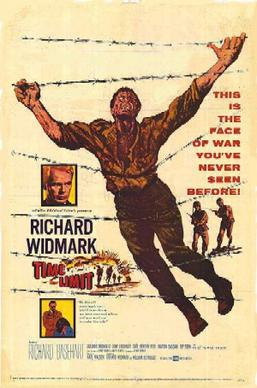The Korean War helped change things when it came to portrayals of war in film. Sure, there were still huge, blockbuster epics to come like The Longest Day and The Greatest Escape. The nastiness of the war, changing times in America, darker methods of war, it all added up to something new, different and often times, uncomfortable. This wasn't soldier shoots soldier anymore. Part mystery, part prisoner of war drama, part courtroom drama, here's 1957's little-known Time Limit.
An officer in the Judge Advocate General's Corps, Colonel William Edwards (Richard Widmark) is wrapping up interviews for a messy little case that has crossed his desk. An Army major, Harry Cargill (Richard Basehart), has been accused of collaborating with the North Koreans during his time in a prisoner of war camp during the Korean War. Edwards has 14 other witnesses testifying what Cargill did in the P.O.W. camp and complicating matters is that Cargill absolutely refuses to defend himself, turning down legal counsel. If anything, it seems that the officer in question wants to be found guilty and prosecuted to the fullest extent, even if that court martial hearing sentences him to death. It seems like an open and shut case, and that's what makes Edwards curious. Something doesn't add up. What happened in that mountaintop prisoner of war camp in North Korea?
Despite the talent assembled to round out the cast in this 1957 military legal drama, I'd never really heard of this film. I've never seen it pop up in TV listings, and the DVD isn't readily available in Best Buys and Barnes and Nobles. But that Christmas stuff, you get some good presents, and I got this flick! What an interesting movie, one that doesn't get the attention and respect it deserves. Actor Karl Malden takes a crack at the directing chair (his only directing effort) and doesn't disappoint. It is a military film ahead of its time, willing to tackle some brutal, harsh realities about the changing concepts of war. As I mentioned earlier, this isn't Soldier A shoots Soldier B. This is total war that goes far beyond the battlefield. Maybe it's because 'Time' tackles those difficult to talk about subjects that its legacy has been buried over the years. Moral of the story? It's worth catching up with.
A co-producer who also encouraged Malden to direct the film, Widmark clearly had an interest in bringing this film to life. He's always been one of my favorite actors, and this is a performance that clearly shows off his ability. Some of his most well-known performances are big and bold, but this one is understated and subtle (and the better for it). His Colonel Edwards just wants to find out the truth, however dark it may be. It's also a performance that foreshadows Widmark's part four years later in Judgment at Nuremberg, a somewhat similarly-themed courtroom drama. Basehart gets the showier part as Major Cargill, an officer and former prisoner clearly struggling with some past demons. It's never over the top, just emotionally charged. Instead, this is a part of a man just trying to hold it all together as a secret from his past tears him apart.
'Time' doesn't have a huge cast, but there isn't a weak link in the bunch. Dolores Michaels provides a bit of a sexy secretary interest as Edwards' secretary, Jean, while Martin Balsam plays Sergeant Baker, Edwards' adjutant. I really liked and appreciated the dynamic among the trio in the office, three different people with different backgrounds all working toward the same goal. Some of the witnesses Edwards seeks out include June Lockhart as Cargill's worrying wife and Rip Torn as Lt. Miller, a fellow prisoner and bunkmate of Cargill's from the POW camp. Also look for Carl Benton Reid as Edwards' superior officer with a vested interest in the case and Khigh Dhiegh as Colonel Kim, the brutal POW camp commander.
Clocking in at 96 minutes, 'Time' is based on a play and definitely has that distinct feel. Malden's focus is on the actors, letting the camera linger for long, dialogue-driven scenes without a cut. Much of the movie is shot in Edwards' office with a quick departure near the halfway point to visit Lockhart's wife character. That lack of style oddly, gives 'Time' some style in a weird way. It's filmed in black and white and with some interesting camera angles, adds an unforeseen sense of tension that helps build the mystery. It isn't always the quickest movie -- especially the first 45 minutes -- but that momentum picks up in a huge way about the 45-minute mark as things start to reveal themselves.
I thought I had the twist pegged, but I was wrong. The final act features two different twists, one working just as well as the other. These aren't just twists for the sake of a surprise or shock either. These are genuine twists that work while also asking some tough questions. An underrated flick that deserves more of a reputation. Definitely worth checking out.
Time Limit (1957): ***/****


No comments:
Post a Comment